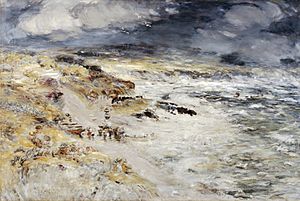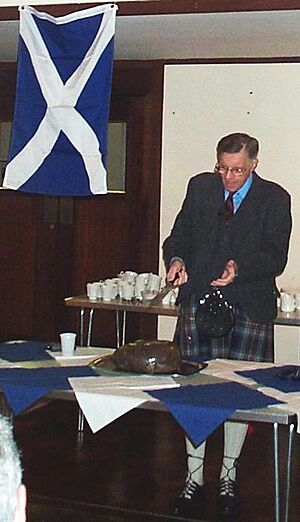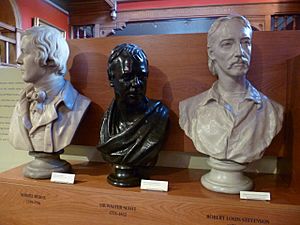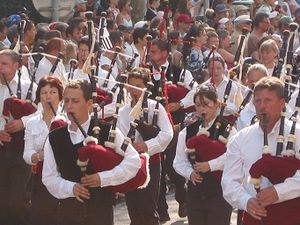Culture of Scotland facts for kids
The culture of Scotland is a rich mix of traditions, arts, and unique ways of life. It includes Scotland's own special legal system, its own banks, and popular sports like golf. The country has a long history of famous writers, artists, and musicians.
Scotland also has its own TV shows and newspapers, delicious food, and interesting folklore and stories. People in Scotland speak different languages, and the country has its own religious traditions that have shaped its history. All these things together make Scottish culture special and unique.
Contents
Scots Law: A Unique Legal System
Scotland has its own legal system called Scots Law. It is separate from the laws in England and is an important part of Scotland's identity. It's based on ancient Roman law and mixes ideas from both civil law (a written code of rules) and common law (based on past court decisions).
When Scotland and England joined together, the agreement said that Scotland could keep its own laws. In Scotland, lawyers are called "advocates." Long ago, different parts of Scotland even had their own local laws, like the Viking-based Udal Law in Shetland and Orkney.
Banking and Money
Banking in Scotland is also a bit different. While the Bank of England is the main central bank for the whole United Kingdom, three Scottish banks can print their own money. These are the Bank of Scotland, the Royal Bank of Scotland, and the Clydesdale Bank. So, you might see different-looking banknotes if you visit Scotland!
Sports in Scotland
Scotland is passionate about sports and has its own national teams for events like the FIFA World Cup. While Scottish athletes join a team from Great Britain for the Olympic Games, they compete for Scotland in other events.
The Home of Golf
Scotland is famous as the "Home of Golf," with some of the most well-known courses in the world. Many people travel to Scotland just to play on its historic links.
Traditional Scottish Sports
Scotland is known for its exciting Highland Games, which are festivals with athletic events like caber tossing (throwing a giant log!). It is also the birthplace of sports like curling (a game played on ice) and shinty, a fast-paced stick-and-ball game similar to hurling in Ireland.
Famous Scottish Literature
Scotland has a long and amazing history of storytelling and poetry. Some of the earliest stories were written in ancient languages, but over time, writers began to use Scots and English.
In the past, kings and queens supported poets and playwrights. After Scotland and England joined, many writers helped keep Scottish culture alive. Some of the most famous Scottish writers include:
- Robert Burns: Considered Scotland's national poet. He wrote poems and songs, like "Auld Lang Syne," which is sung around the world on New Year's Eve.
- Walter Scott: He wrote exciting historical novels like Ivanhoe and Rob Roy, which helped shape how people saw Scotland.
- Robert Louis Stevenson: He wrote classic adventure stories that are still loved today, such as Treasure Island and The Strange Case of Dr. Jekyll and Mr. Hyde.
- Arthur Conan Doyle: The creator of the world's most famous detective, Sherlock Holmes.
In the 20th century, there was a new wave of Scottish writing, and today, Scottish authors like Carol Ann Duffy, who was the first Scot to be named British Poet Laureate, continue to be popular worldwide.
Art from Scotland

Art has been a part of Scotland for thousands of years. The earliest art includes mysterious carved stone balls from the Neolithic period and decorated objects from the Bronze Age and Iron Age. In the early Middle Ages, the Picts carved amazing symbols and scenes on large stones, known as Pictish stones.
Later, Scottish art was influenced by styles from other parts of Europe. After the Reformation, artists began to paint more non-religious subjects, including portraits of important people and beautiful decorations inside homes.
In the 18th and 19th centuries, Scottish artists like Allan Ramsay and Henry Raeburn became famous for their portraits. Artists also began painting the dramatic landscapes of the Highlands.
In the late 19th and early 20th centuries, a group of artists called the Glasgow Boys became famous. Around the same time, the artist and architect Charles Rennie Mackintosh created a unique style that made him famous across the globe. Today, Scotland continues to produce talented and influential artists. You can see amazing art collections at museums like the National Gallery of Scotland in Edinburgh and the Kelvingrove Art Gallery and Museum in Glasgow.
Music of Scotland
Scotland is famous for its traditional music, which often features the powerful sound of the bagpipes. Scottish folk music is very lively and has remained popular for centuries. Many people enjoy going to a ceilidh (pronounced "kay-lee"), which is a fun social event with traditional dancing and music.
Scottish music has influenced many other types of music around the world. Today, you can hear both traditional and modern music at festivals across the country, like Celtic Connections in Glasgow.
Media in Scotland
Scotland has its own media, which is separate from the rest of the UK. There are several national newspapers, such as the Daily Record, The Herald, and The Scotsman.
BBC Scotland provides Scottish TV and radio channels, including programs in the Scottish Gaelic language. It produces news shows and popular dramas that are watched both in Scotland and across the UK. There are also independent TV channels like STV that broadcast programs specifically for a Scottish audience.
Food and Drink

Fair fa' your honest, sonsie face,
Great chieftain o' the puddin-race!
Scottish food is hearty and delicious. While some people joke about the deep-fried Mars bar, traditional Scottish cuisine has much more to offer. Some famous dishes include:
- Haggis: Scotland's national dish, a savoury pudding often served with neeps and tatties (turnips and potatoes).
- Fish and chips: A popular classic throughout the country.
- Scottish Salmon: Famous around the world for its excellent taste.
- Shortbread: A sweet, crumbly biscuit that is a popular treat.
- Cranachan: A tasty dessert made with oats, cream, whisky, and raspberries.
Scotland is also famous worldwide for its Scotch whisky distilleries. For a non-alcoholic option, the bright orange soft drink Irn-Bru is so popular that many call it Scotland's "other national drink."
Folklore and Traditions
Scotland is a land of myths, legends, and fascinating traditions. One of the most famous is Halloween, which has its roots in the ancient Gaelic festival of Samhain. People believed that on this night, the boundary between the living and the spirit world was thin.
Traditional Scottish Halloween customs include:
- Guising: Children dress up in costumes and go from house to house, telling a joke or singing a song to earn treats. This is an older version of trick-or-treating.
- Turnip Lanterns: Before pumpkins were common, Scots would carve scary faces into turnips to create lanterns.
- Apple Bobbing: A fun party game where you try to catch apples floating in a tub of water with your teeth.
When Scottish and Irish immigrants moved to North America, they brought these traditions with them, which helped make Halloween the popular holiday it is today.
Languages and Religion
Scotland has its own unique languages that are an important part of its identity. Besides English, many people speak Scots, a language with a long history in literature and song. There is also Scottish Gaelic, which is spoken mainly in the Highlands and Islands.
Christianity has been the main religion in Scotland for over 1,400 years. The Church of Scotland is the national church, which is separate from the Church of England.
The patron saint of Scotland is Saint Andrew, and Saint Andrew's Day is celebrated on 30 November each year.
Interceltic Festivals
As one of the Celtic nations, Scotland shares a cultural heritage with places like Ireland, Wales, and Brittany in France. Scotland celebrates these connections at interceltic festivals at home and around the world.
Major festivals like Celtic Connections in Glasgow and the Hebridean Celtic Festival in Stornoway bring together musicians and artists from across the Celtic world. Scots also take part in huge international events like the Festival Interceltique de Lorient in France, sharing their music and culture with thousands of people.
National Symbols
See also
 In Spanish: Cultura escocesa para niños
In Spanish: Cultura escocesa para niños



